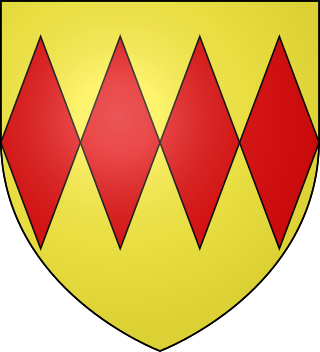Related Research Articles

Walter Stewart was the 6th Hereditary High Steward of Scotland and was the father of King Robert II of Scotland, the first Stewart monarch.
The Justiciar of Scotia was the most senior legal office in the High Medieval Kingdom of Scotland. Scotia in this context refers to Scotland to the north of the River Forth and River Clyde. The other Justiciar positions were the Justiciar of Lothian and the Justiciar of Galloway.
The Justiciar of Lothian was an important legal office in the High Medieval Kingdom of Scotland.
John Comyn (Cumyn) was Lord of Badenoch in Scotland. He was Justiciar of Galloway in 1258. He held lands in Nithsdale and Tynedale.

Clan Lindsay is a Scottish clan of the Scottish Lowlands.

David de Lindsay, Lord of Barnweill and Byres, was a Scottish knight and crusader. A minor baronial lord, he was the son of David de Lindsay and held lands in East Lothian and South Ayrshire. He became Justiciar of Lothian under Alexander II of Scotland in 1241. This position had been held by his father earlier in the century.
Sir David de Lindsay, Lord of Luffness, Crawford, Ercildum and Limési, known as "the elder" to distinguish him from his son, was an Anglo-Scottish baron of the 12th and 13th century.

Sir Alexander Lindsay, Lord of Barnweill, Byres and Crawford, also known as Alexander de Lindsay, was a Scottish noble.

Sir Patrick de Graham, Lord of Kincardine, was a 13th-century Scottish noble and soldier.
Sir David de Graham of Dundaff was a 13th-century Scottish noble.

Sir David Lindsay of Crawford was a Scottish noble.

Peter FitzHerbert, also known as Piers FitzHerbert, Lord of Blenlevenny, was a 13th-century nobleman and Sheriff of Yorkshire. FitzHerbert was one of the Counsellors named in Magna Carta in 1215. He was the son of Herbert FitzHerbert and Lucy of Hereford.
Sir Walter de Moray, Lord of Petty, Bracholy, Boharm, Arteldol and Bothwell, Justiciar of Lothian was a 13th-century Scottish noble.
Sir William de Lindsay (1155–1205), Lord of Crawford, Baron of Luffness, Justiciar of Lothian was a 12th-century Scottish noble.
Sir Walter de Olifard, Lord of Bothwell and Abernethy and Justiciar of Lothian, was a Scottish noble.
Sir Geoffrey de Melville, Lord of Melville, Sheriff of Edinburgh, Justiciar of Lothian was a 12th-century Scottish noble.

Henry de Pinkeney, Lord of Weden-Pinkeney, Fulmer and Datchet in England and Lord of Crawford in Scotland, was a 13th-century English noble.
William de Lindsay, Lord of Lamberton and Molesworth, Fordington and Ulceby, Sheriff of Berwick was a Scottish noble, who held lands in Scotland and England.
Walter de Lindsay, Lord of Lamberton and Molesworth, Fordington and Ulceby, was a Scottish noble, who held lands in Scotland and England.

Sir James (de) Lindsay, 9th Lord of Crawford, Knight Banneret, Lord of Crawford, Kirkmichael, Wigton, Symontoun, and of many other baronies, claiming also to be Lord of Buchan, was a Scottish feudal lord.
References
- McAndrew, Bruce A. (2006). Scotland's historic heraldry. Boydell Press. ISBN 9781843832614. OCLC 71264510.
- Mosley, Charles (2003). Burke's peerage, baronetage and knightage (107th ed.). Burke's Peerage & Gentry. ISBN 0-9711966-2-1. OCLC 52621466.